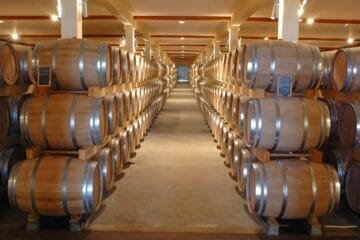
** The Indelible Legacy of Jan Boland Coetzee: A Tribute to a Wine Legend and Rugby Icon****
In the world where wine and rugby converge, few figures have left as profound an imprint as Jan Boland Coetzee. Born on January 20, 1945, and passing away on September 12, 2025, Coetzee’s life was a tapestry of deep agricultural roots, pioneering winemaking techniques, and indomitable spirit on the rugby field. His legacy is one that resonates not only through the vineyards of South Africa but also in the hearts of those who knew him as a mentor, friend, and family man.
Jan Boland Coetzee was born into a lineage that dates back to 1679, when his ancestors landed in Table Bay. The Coetzees were among the first to farm Grenache in Piekenierskloof, a testament to their enduring commitment to the land. Growing up on the West Coast, Coetzee’s early life was steeped in the rhythms of farming and the natural beauty of the region. His deep connection to the environment would later shape his philosophy as a winemaker.
You need to listen to the voice of the land,” Coetzee once mused, a sentiment that guided his entire career.
“Wine is a mirror of the environment. You need to listen to the voice of the land,” Coetzee once mused, a sentiment that guided his entire career. This early exposure to agriculture and the natural world laid the foundation for his innovative approach to winemaking, which would challenge conventional practices and push the boundaries of what was possible in South African viticulture.
From Stellenbosch to the Rugby Field
Coetzee’s journey took him from the humble beginnings of his family farm to the halls of Stellenbosch University, where he deepened his knowledge of oenology and excelled on the rugby field. His time at university was pivotal, as it not only solidified his passion for wine but also honed his leadership skills. It was during this period that Coetzee’s multifaceted talents became apparent. He played flank for the Springboks from 1974 to 1976, a testament to his physical prowess and strategic acumen.
The day after his passing, the Springboks faced New Zealand in a match that opened with a moment of silence in Coetzee’s honor. It was as if his spirit still fueled the team, for they delivered a historic victory against the All Blacks, handing them their heaviest defeat ever. This triumph was a fitting tribute to a man who had always believed in pushing limits and exceeding expectations.
A Pioneer in Winemaking
Coetzee’s winemaking career began at Kanonkop in 1967, where he produced the estate’s first vintage in 1973. His innovative approach was evident from the start. Drawing on friendships with cabernet-secret-why-its-outshining-bordeaux/”>Bordeaux coopers forged during his rugby days in France, Coetzee introduced barriques to Kanonkop, a move that would revolutionize South African winemaking.
In 1980, he purchased Vriesenhof on the slopes of Stellenbosch’s Paradyskloof. Here, he worked with Pinot Noir and Grenache long before they became fashionable. His foresight and dedication to these varieties have since been vindicated, as both grapes are now celebrated in South African wine culture.
Challenging the Status Quo
His love for Burgundy inspired him to change this status quo.
During a time when white winemaking at the Cape was dominated by Chenin Blanc and Colombard, Coetzee had his sights set on Chardonnay. His love for Burgundy inspired him to change this status quo. In a daring move, he moved his family of five to Beaune, where he began smuggling Chardonnay plant material back to South Africa in various ingenious ways—tucked into chocolate boxes, hidden in jacket linings, and even smuggled in nappies.
These actions did not go unnoticed by the authorities. In 1986, Coetzee and his fellow conspirators were summoned before a Commission of Enquiry. Instead of facing prison time, they managed to lift the embargo on importing plant material, leading to the formation of the Vine Improvement Association (VIA). This episode is now seen as a pivotal moment in South African viticulture, one that Coetzee played a crucial role in shaping.
A Legacy of Influence
Adi Badenhorst, a well-known wine producer and lifelong friend, reflects on Coetzee’s profound influence. “Jan was one of those complete enigmas, a deep thinker behind a gruff exterior,” Badenhorst said. “When he spoke, his knowledge of South African farming, wine, and his sense of humor kept us listening for hours, especially to stories of him growing up on the West Coast.”
I’m grateful he had the chance to know them.
Badenhorst’s memories paint a picture of Coetzee as a mentor and a friend who inspired those around him. “He was a wonderful grandfather to my children. I’m grateful he had the chance to know them. When a man like Jan leaves his mark, it burns deep, and you are never the same again,” Badenhorst added.
A Life Well Lived
Jan Boland Coetzee’s life is a testament to the power of vision, courage, and a deep respect for the land. His legacy continues to inspire new generations of winemakers and rugby players alike. As we raise a glass to his memory, we honor not just a great man but a pioneer who challenged conventions and left an indelible mark on South African wine and rugby.
In the words of Badenhorst, “A massive tree has fallen, whose roots have touched thousands of people, both inspiring and disrupting the status quo. That’s my Jan Boland Coetzee. I’ll miss him immensely.” His legacy lives on in the vineyards he cultivated, the wines he crafted, and the hearts he touched.
Questions & Answers
What were the key contributions of Jan Boland Coetzee to South African wine and rugby?
Jan Boland Coetzee made significant contributions to both South African wine and rugby. In the world of wine, he was a pioneering winemaker who brought innovative techniques to his family’s vineyards in Piekenierskloof, where they were among the first to farm Grenache. His deep connection to the land and commitment to sustainable practices elevated the quality and reputation of South African wines on both local and international stages. On the rugby field, Coetzee was a respected player known for his indomitable spirit and leadership. He inspired many through his dedication and passion for the sport, contributing to the growth and success of South African rugby.
How did Jan Boland Coetzee’s early life influence his career as a winemaker?
Jan Boland Coetzee’s early life deeply influenced his career as a winemaker. Born into a lineage dating back to 1679, he grew up on the West Coast of South Africa, where his family had been farming since their ancestors landed in Table Bay. The Coetzees were among the first to farm Grenache in Piekenierskloof, and this rich agricultural heritage instilled in Coetzee a profound respect for the land and its traditions. His early life was steeped in the rhythms of farming and the natural beauty of the region, which later shaped his philosophy as a winemaker. This deep connection to the environment and commitment to sustainable practices were hallmarks of his approach to winemaking, contributing to his success and legacy.
What legacy did Jan Boland Coetzee leave behind in South Africa?
Jan Boland Coetzee left an enduring legacy in South Africa as a revered figure in both the wine industry and rugby. His pioneering work in winemaking elevated the quality and reputation of South African wines, contributing to their international recognition. He was known for his innovative techniques and commitment to sustainable practices, which inspired other winemakers and helped shape the future of South African viticulture. In rugby, Coetzee’s indomitable spirit and leadership on the field made him a respected mentor and role model. His legacy is not only found in the vineyards and rugby fields but also in the hearts of those who knew him as a mentor, friend, and family man, leaving a lasting impact on the communities he touched.
Information sourced from industry reports and news outlets.




